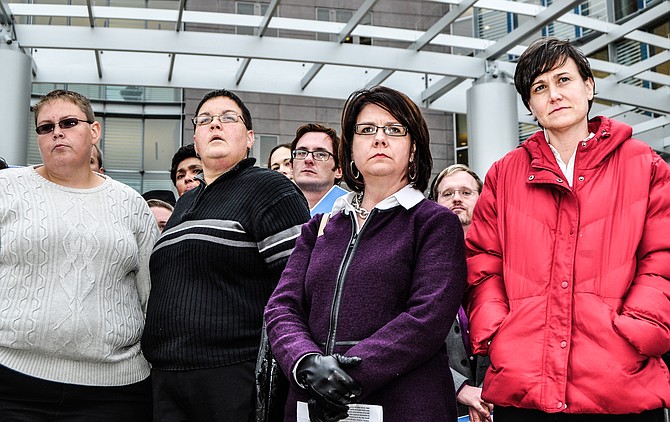The plaintiffs: Andrea Sanders and Rebecca "Becky" Bickett; Carla Webb and Joce Pritchett Photo by Trip Burns.
A federal judge has overturned Mississippi's constitutional ban on same-sex marriage, but put the ruling on hold to allow the state an opportunity to appeal to a higher court.
In his 72-page order, U.S. District Judge Carlton Reeves wrote:
In reviewing the arguments of the parties and conducting its own research, the court determined that an objective person must answer affirmatively to the following questions:
Can gay and lesbian citizens love?
Can gay and lesbian citizens have long-lasting and committed relationships?
Can gay and lesbian citizens love and care for children?
Can gay and lesbian citizens provide what is best for their children?
Can gay and lesbian citizens help make their children good and productive citizens?
Without the right to marry, are gay and lesbian citizens subjected to humiliation and indignity?
Without the right to marry, are gay and lesbian citizens subjected to state-sanctioned prejudice?
Answering “Yes” to each of these questions leads the court to the inescapable conclusion that same-sex couples should be allowed to share in the benefits, and burdens, for better or for worse, of marriage.
The court concludes that Mississippi’s same-sex marriage ban deprives same-sex couples and their children of equal dignity under the law. Gay and lesbian citizens cannot be subjected to such second-class citizenship.
Mississippi’s same-sex marriage ban violates the Due Process and Equal Protection Clauses of the Fourteenth Amendment.
Roberta Kaplan, who is representing two Mississippi couples, argued in the 2013 landmark case United States v. Windsor, in which the Supreme Court ruled the federal Defense of Marriage Act unconstitutional. During a recent hearing, Kaplan used the Windsor case to show that LGBT people have equal dignity and should not be treated differently under the law.
The Campaign for Southern Equality is the plaintiff in the case, which involves lesbian couples Andrea Sanders and Rebecca Bickett and Jocelyn Pritchett and Carla Webb.
R.L. Nave contributed to this story.



Comments
Use the comment form below to begin a discussion about this content.
comments powered by Disqus